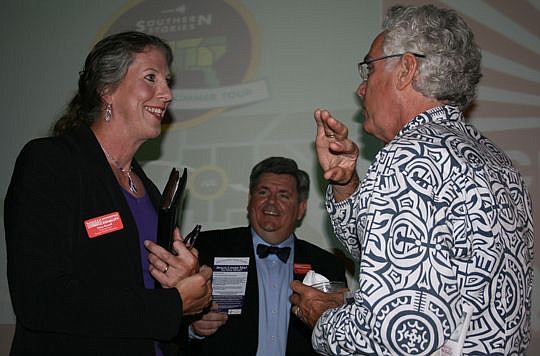
Since City Council member Tommy Hazouri withdrew legislation to expand the city’s human rights ordinance in February, it’s mostly been quiet publicly on the local LGBT advocacy front.
The absence of an active public debate on the topic presents an ideal opportunity to introduce the community to lesbian, gay, bisexual and transgender people, an international human rights advocate said Tuesday.
Ross Murray, director of programs for LGBT rights organization GLAAD, said knowing LGBT people fosters understanding and accelerates acceptance.
Murray said research by his organization and other groups shows Americans are slowly but steadily becoming amenable to nondiscrimination laws in part due to more people getting to know those in the LGBT communities.
In particular, “people don’t know transgender people,” Murray told a roomful of LGBT rights advocates during a Jacksonville Coalition for Equality panel discussion, including how to protect transgender students from discrimination.
“Let the folks who would be helped by the human rights ordinance — those that are harmed by not having its impact — tell their stories,” he said.
Like St. Augustine resident Tricia Russell.
Also a panelist, Russell transitioned from Patrick to Tricia in 2012, two decades into her banking career.
Russell says she had — and continues to have — the full support of her employer, Bank of America.
“I lived most of my life in fear that everyone would know that I was transgender,” said Russell, 59. “I took a leap of faith at Bank of America (and) every step of the way, I was just blown away by the level of acceptance, support and encouragement.”
Russell said the bank’s human resources management executive she approached about her transition was not only helpful and understanding, he said he thought Russell would be a better employee as a result of the decision.
“He said, ‘Not only is it OK, Tricia, that you bring your whole self to work, but I implore you to bring your whole self to work,’” Russell said. “The reality of what unfolded was so different than what I had feared. It was amazing.”
Russell is now broadly engaged in LGBT advocacy work, including serving as an Equality Florida board member.
Backed by the Coalition for Equality, other human rights organizations and hundreds of local businesses, Hazouri proposed city protections for sexual orientation, gender identity and gender expression in employment, housing and public accommodations.
Lacking the votes needed for the ordinance’s passage, however, Hazouri withdrew his legislation and pledged to work on changes that would better ensure its passage when it is reintroduced.
It was the second time in the past several years that LGBT protections were effectively rejected by the council.
The Coalition for Equality panel also discussed efforts nationwide to require transgender people to use public restrooms corresponding to the gender on their birth certificates. Support of such anti-LGBT laws is based on ignorance and hate — and suggest that transgender people are predators, the panelists said.
“We’ve got to expose it as the myth that it is,” said Jimmy Midyette, Coalition for Equality legislative director.
More than 500 Jacksonville companies and organizations have endorsed expanding Jacksonville’s human rights ordinance to protect lesbian, gay, bisexual and transgender people.
Many of the 125 audience members are strong proponents of expanding Jacksonville’s human rights ordinance.
“I recognize so many of you who came to the City Council to talk about the HRO and talk about your experiences, only to hear vile things about yourselves and true lies that were told both from the dais and from other folks who came to speak,” Midyette, who moderated the panel discussion, told the audience.
Also during the discussion, OneJax Executive Director Nancy Broner discussed the Duval County School Board’s long-held human rights policies, including allowing students to use the bathrooms and locker rooms of their gender with which they identify.
A woman recently sued the school system, claiming such a policy robs her child and other students of a “safe and supportive environment that would allow them to thrive and grow, and deprives them the right to bodily privacy."
“School district policies are inclusive and have been for 10 years and not one incident has ever occurred,” said Broner, a school board member from 2002-10. “This just further dispels the myths around what might happen … and the fearmongering.”
OneJax is a nonprofit that promotes diversity as the foundation for a strong community.
“We put those policies in place because it was the right thing to do –– not just for students, but for teachers and staff,” she said. “There is not much danger in our policies being repealed, but we need to be vigilant.”
The panel discussion was held at the Museum of Contemporary Art Jacksonville, which supports the Coalition for Equality and updating Jacksonville’s human rights ordinance.
“There’s nothing more contemporary, nothing more than an idea of our time, than equality,” said MOCA Communications Director Denise Reagan.